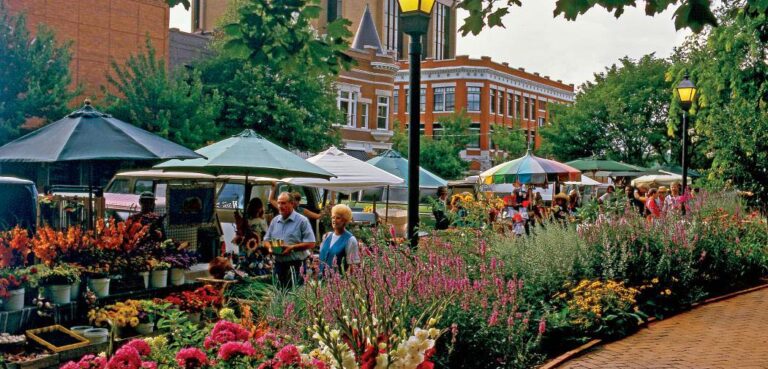Fayetteville, AR Sustainability Promotes Growth, Local Sourcing
Sustainability efforts help residents source fresh local foods

From its vibrant farmers market to a school district that grows food for students, Fayetteville sets an example for communities looking to support their own while eating locally and sustainably. Then there’s local nonprofits, including Feed Communities, which aim to make healthy foods more available to those in need.
The Farmers’ Market
For more than 41 seasons the Fayetteville Farmers’ Market on the downtown square has showcased some 108 vendors sharing their best produce. According to FFM vendor coordinator Teresa Maurer, some of those vendor members have participated almost since the beginning.
“The most important thing to know is that we are truly local,” Maurer says. “If you’re selling at our market, whether you’re a grower, artisan or selling an added-value product, you must be producing it within the four-county area we serve.”
The market is member operated – their 108 current member-vendors do the decision making, including a nine-member board of directors.
“We’re not directly part of the city, though there’s a city ordinance that covers the market; we’re a partnership with Fayetteville, not of Fayetteville,” she says. A commission paid by the members supports the costs and marketing.
About 70 percent of sellers offer fruit and vegetables, 20 percent art and craft items, and 10 percent value-added products or meat (currently about five vendors offer locally raised meats).
The market has worked with the local school district to help source produce and is in talks now with the area VA to help source produce for them as well. Maurer says she regularly sees chefs from local restaurants shopping the market and tries to alert those interested in advance of what’s available.
Fayetteville Schools
The Fayetteville Seed to Student program makes fresh, locally sourced foods available to the city’s 14 schools, according to district nutrition supervisor Allyson Mrachek. The program has three components:
• The local purchasing of fruits, vegetables, frozen beef and local applesauce.
• School gardens in 10 of 14 schools, as part of regular curriculum and extracurricular activities.
• A community outreach role, combining educating the community, fundraising and marketing.
The program worked closely with the farmers market to put it all together, encouraging bids from local producers, six of whom came together to offer produce and beef to all 14 schools for the lunch and summer meal programs.
This is the second year of a preservation program, thanks to a grant from the USDA farm to schools program, whereby purchased local produce is frozen to use in the winter. The schools also host educational lunches, plus morning presentations at the middle and elementary level, with help from nonprofit Appleseeds Inc. In all cases, they make sure kids know what’s local in their meals.
Mrachek says they started small, with a single school and a passionate staff, and in the past few years have grown it to encompass the whole district. “We also started that way with procurement, beginning with the summer lunch program in one school, which led to four schools, then the whole district.” A SARE grant shortly after she arrived helped do even more.
Community Outreach
There’s plenty of effort to expand access to good foods for everyone in Fayetteville, exemplified by Denise Garner, CEO of Feed Communities.
“I deal with making sure there’s access justly across the supply chain to healthy foods,” she says. “We make sure farmers, restaurant workers and the like also get their fair share. Farmers have been so generous, donating produce gleaned after the market, planting extra rows of food, donating plants and seeds.”
Feed Communities has three aspects: Feed Fayetteville, a pilot program to deal with local hunger and health issues; Feed Communities, which consults on issues of food insecurity; and the magazine Edible Ozarkansas, which shares regional food culture,and information on health, environmental stewardship, and edible equity. All of them underline the region’s awareness of food justice and to promote sustainable eating.
Across the board, Fayetteville is finding ways to make healthy, fresh food a daily reality for everyone.
